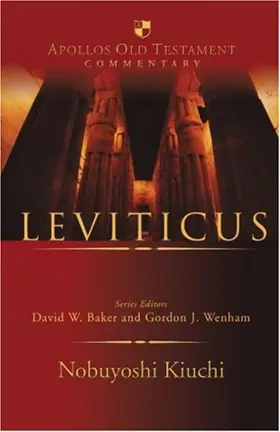

Leviticus
in Apollos Old Testament Commentary
Pages
538
Publisher
IVP Academic
Published
2007
ISBN-13
9780830825035
The Old Testament Book of Leviticus is the sequel to Exodus in that it deals with a deeper dimension of the Sinaitic covenant, giving various rules for the life of the Israelites and for the sacrifices and offerings to be performed in the sanctuary. It addresses the question of how the Israelites--human beings--can live in proximity to the holy God who has promised to dwell in their midst.
In this excellent commentary, Nobuyoshi Kiuchi offers in-depth discussion of the theology and symbolism of Leviticus. He argues that its laws present an exceedingly high standard, arising from divine holiness, and the giving of these laws to the Israelites is intended to make them aware of their sinfulness, to lead them to hopelessness and ultimately to destroy their egocentric nature.
To be confronted by the laws in Leviticus is to recognize the vast distance that separates the holy from the unclean and sinful, and so to appreciate afresh the grace of God, ultimately expressed in the life and work of Christ.
In this excellent commentary, Nobuyoshi Kiuchi offers in-depth discussion of the theology and symbolism of Leviticus. He argues that its laws present an exceedingly high standard, arising from divine holiness, and the giving of these laws to the Israelites is intended to make them aware of their sinfulness, to lead them to hopelessness and ultimately to destroy their egocentric nature.
To be confronted by the laws in Leviticus is to recognize the vast distance that separates the holy from the unclean and sinful, and so to appreciate afresh the grace of God, ultimately expressed in the life and work of Christ.
Collections
This book appears in the following featured collections.
- Non-Western and BIPOC Commentaries by Matt Quintana
Reviews
This is an excellent commentary on Leviticus. It isn’t quite as readable as Wenham’s NICOT (which is remarkable and a classic) but it’s also 30 years newer and so more engaged with what's been published since 1979. Kiuchi is to be commended for trying something a bit different - his take on holiness is fascinating and resonates with the NT well.
Nobuyoshi Kiuchi’s Leviticus is the third volume published in the Apollos Old Testament Commentary series. The series “aims to to take with equal seriousness the divine and human aspects of Scripture. It expounds the books of the Old Testament in a scholarly manner accessible to non-experts, and show s the relevance of the Old Testament to modern readers” (from back cover). The format is similar to that of the Word Biblical Commentary series with a translation, notes, form and structure, comment and finally explanation.
Kiuchi is a Japanese Old Testament scholar from Tokyo Christian University. His inclusion in this series reflects what appears to be an intentional effort by the editors to assemble a fairly international team of writers. Kiuchi did his PhD under Gordon Wenham who produced what has been by widely considered on of the best commentaries on Leviticus currently available. Wenham’s pupil has given us a commentary that rightly belongs on the shelf next to his own work.
This commentary gives helpful textual, philological and historical comments, but its greatest strengths are in the areas of literary analysis and theology. Kiuchi argues that Leviticus is not giving laws to a people already “saved” by the exodus, but rather teaches them their need for salvation (p. 28). He sees Leviticus as essentially a commentary on Genesis 3 and derives many of his interpretations of cleanness laws from their connections to the account of the fall. This analysis yields some very insightful connections. The external rituals must be connected to an internal holiness that confronts the problem of sin. The purpose of the laws are “to make the Israelites aware of their egocentric nature, to destroy this nature, thereby leading them to a state of holiness characterized by a heart free of selfish motives” (p. 46). For the Christian, the destruction of this nature is only accomplished via identification with our crucified Lord, the ultimate sacrifice. Kiuchi regularly helps to make these connections to NT theology.
This theological reading is remarkably helpful for understanding the text and its contemporary significance. My biggest criticism of this commentary is that at times it appeared to this reviewer that Kiuchi had failed to make his logic explicit. Often data is presented with the straightforward claim that the data implies a certain conclusion. However, it was unclear what the connection was between the data and the conclusion. I found myself wondering if the data couldn’t be interpreted another way. Without being explicitly shown the logic behind the argument, I was unsure how to assess it. So much of the commentary depends on some of these conclusions drawn that it did seem to weaken the commentary ever so slightly.
That being said, this is an outstanding commentary that deserves to be used frequently by preachers looking for help with this book which can be obscure to many. I expect this commentary will help bring Leviticus to life for Christians today.
IVP provided me with a free copy with no expectation of a favorable review.

